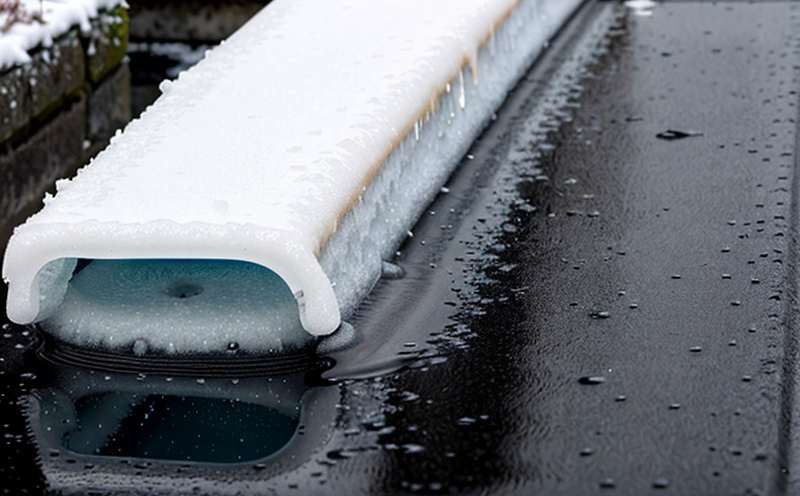Testing the resistance of waterproofing and sealant materials to freeze-thaw cycles
The Crucial Role of Freeze-Thaw Cycle Testing in Ensuring Long-Term Waterproofing and Sealant Performance
As the demand for durable and long-lasting waterproofing and sealant materials continues to rise, businesses are increasingly seeking innovative solutions to ensure their products performance under various environmental conditions. One critical aspect that requires thorough evaluation is the resistance of these materials to freeze-thaw cycles, a phenomenon that can significantly impact their durability and efficacy.
What is Freeze-Thaw Cycle Testing?
Freeze-thaw cycle testing involves subjecting waterproofing and sealant materials to repeated cycles of freezing and thawing to assess their resistance to degradation. This laboratory service provided by Eurolab simulates real-world conditions, providing valuable insights into a materials ability to withstand the stresses imposed by temperature fluctuations.
Why is Freeze-Thaw Cycle Testing Essential for Businesses?
Incorporating freeze-thaw cycle testing into your product development and quality control processes offers numerous advantages. By understanding how your materials perform under these conditions, you can
Enhance Product Reliability Identify potential weaknesses in your products performance, ensuring that they meet or exceed customer expectations.
Reduce Warranty Claims and Liability Minimize the risk of costly warranty claims and liability by selecting materials with proven resistance to freeze-thaw cycles.
Improve Market Competitiveness Differentiate your brand from competitors by offering high-performance waterproofing and sealant solutions.
Comply with Industry Regulations Meet or exceed industry standards and regulations, such as those set forth by ASTM (American Society for Testing and Materials) and ISO (International Organization for Standardization).
Optimize Material Formulation Use the insights gained from freeze-thaw cycle testing to reformulate materials that better withstand environmental stresses.
Benefits of Freeze-Thaw Cycle Testing
Here are some key benefits of incorporating freeze-thaw cycle testing into your product development process
Accurate Material Evaluation Comprehensive testing ensures that you have a clear understanding of your materials strengths and weaknesses.
Enhanced Product Safety Identify potential risks associated with material degradation, ensuring the safety of users and reducing liability.
Cost Savings Avoid costly rework or replacement due to inadequate material performance.
Increased Customer Satisfaction Offer high-quality products that meet or exceed customer expectations, fostering long-term relationships and driving business growth.
Comprehensive Freeze-Thaw Cycle Testing Services
Eurolab offers a range of freeze-thaw cycle testing services tailored to meet the specific needs of your waterproofing and sealant materials. Our experienced technicians conduct thorough evaluations using industry-standard protocols, providing you with
Standardized Test Methods Adherence to established guidelines ensures that our results are comparable to those obtained through other laboratories.
Customized Testing Programs Flexible testing schedules accommodate your unique requirements and time constraints.
Detailed Reporting and Analysis Clear, concise reports provide actionable insights into material performance.
Frequently Asked Questions (FAQs)
What types of materials can be tested for freeze-thaw resistance?
Waterproofing membranes, sealants, coatings, and other materials used in building construction, infrastructure, and industrial applications.
How long does a typical freeze-thaw cycle test take?
Test duration varies depending on the specific protocol and material being evaluated. Typically, tests range from several days to several weeks.
What kind of equipment is required for freeze-thaw cycle testing?
Specialized equipment, such as environmental chambers or freezers, are used to simulate freeze-thaw cycles under controlled conditions.
Can Eurolab assist with material formulation and reformulation based on test results?
Yes! Our experts can help you refine your materials to better withstand environmental stresses and meet industry standards.
Conclusion
Incorporating freeze-thaw cycle testing into your product development process is a crucial step towards ensuring the long-term performance and durability of your waterproofing and sealant materials. By leveraging Eurolabs comprehensive testing services, you can
Enhance product reliability and customer satisfaction
Reduce warranty claims and liability
Improve market competitiveness through high-performance solutions
Comply with industry regulations and standards
Dont risk the integrity of your products choose Eurolab for reliable freeze-thaw cycle testing and unlock the full potential of your waterproofing and sealant materials.
-
Simulating the effects of repeated freeze-thaw cycles on construction materials
-
Testing materials for their ability to withstand the expansion and contraction caused by freezing and thawing
-
Ensuring that concrete, brick, and stone retain their integrity when subjected to freezing temperatures followed by thawing
-
Evaluating the ability of materials to resist cracking, spalling, or delamination after freeze-thaw exposure
-
Testing how materials like asphalt and cement react to temperature fluctuations and freezing water
-
Simulating winter conditions to assess how materials perform in regions with extreme cold and fluctuating temperatures
-
Ensuring that construction materials maintain their strength and structure when exposed to freeze-thaw conditions
-
Verifying that construction materials used in roads, bridges, and pavements are resilient to freeze-thaw damage
-
Simulating the effects of wetting and drying, combined with freezing and thawing, on construction materials
-
Testing for the ability of materials to resist moisture absorption and freezing-related damage
-
Evaluating the durability of materials used in exterior applications such as roofing, facades, and pavements under freeze-thaw conditions
-
Ensuring that materials used in foundations and basements are resistant to water infiltration and freeze-thaw cycles
-
Verifying that materials used for building envelopes can resist cracking, erosion, and damage from freezing conditions
-
Testing how freeze-thaw cycles affect materials used in high-altitude or northern climates
-
Simulating freeze-thaw cycles in combination with other environmental stresses to assess material resilience
-
Testing for changes in the dimensional stability of materials when exposed to freezing and thawing
-
Verifying the performance of materials used in landscaping and exterior finishes after freeze-thaw exposure
-
Ensuring that frozen soil and other environmental factors do not damage foundation materials during freeze-thaw cycles
-
Testing the ability of materials to resist degradation due to the crystallization of moisture within the material during freezing
-
Simulating the effects of repeated freeze-thaw cycles on materials in coastal areas where saltwater may accelerate deterioration
-
Testing the performance of thermal insulation materials under freeze-thaw conditions




